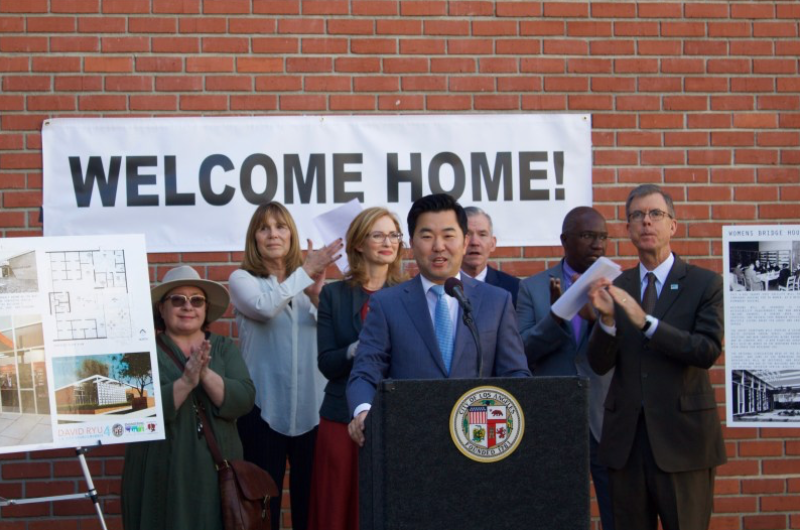CommentsDEEGAN ON LA-Can you run for re-election to public office in Los Angeles without convincing voters that you’ve done something concrete to solve our deeply rooted homelessness crisis, so evident on sidewalks across the city?
Mayor Garcetti is termed out in 2022 and has also dropped his Presidential aspirations -- although he theoretically could luck out with a gubernatorial appointment if a sitting Senator doesn’t stay for a full term -- so he doesn’t need to answer the question of his own electability.
His legacy is slowly taking shape as the mayor who presided over the inability of the city to decrease the raw numbers of the homeless population, which has grown. The challenges and failures of ongoing efforts to house the homeless have created a situation now morphing into an alarming public health crisis.
Will City Councilmembers hoping to be re-elected face the same fate as the Mayor when the voting public sees “too little, too late” results from efforts to solve our homelessness crisis? While anything could happen in the remaining three years of the mayoral term, it will be on the Council District level that communities must hope to see an improvement.
In nineteen weeks (November 9) candidates in even numbered council districts will file to run for City Council elections. Seven seats are up for voter consideration in the March 2020 Primary Election. Only three incumbents, David Ryu (CD4), Nury Martinez (CD 6), and Marqueece Harris-Dawson (CD 8) would be candidates who have a record of helping the homeless that could help their re-election prospects.
Another three, Paul Krekorian (CD2), Herb J. Wesson, Jr. (CD 10), and Jose Huizar (CD 14) are termed out, and one seat, Greig Smith (CD12), has been in limbo since incumbent Mitch Englander went to the private sector late last year.
A former chair of the City Council's Homelessness and Poverty Committee, Marqueece Harris-Dawson (CD 8), has broken ground for housing that will provide beds for 100 homeless men and women at 5965 S. St. Andrews Place in South LA. It’s part of the city’s A Bridge Home (ABH) program that incentivizes districts with money ($1.3 million), enhanced street services and public safety benefits if they place a homeless shelter in the district.
On the ABH progress dashboard, Harris-Dawson is at ABH step 5 (“construction”) of six steps, the final being “completed.”
Also showing results is David Ryu (CD4) (photo above, center) who has two ABH projects at step 5, one at 3248 W. Riverside Drive in Los Feliz, and another at 1403 N. Gardner Street, in Hollywood. Both are in the construction stage and will be completed shortly.
Ryu tried to get an ABH homeless shelter in Sherman Oaks but was rebuffed by the community, although that doesn’t seem to discourage him, as evidenced by his statement to CityWatch that “I continue to seek solutions to our affordable housing and homelessness crisis across Council District Four, and I’m proud to meet with neighbors and work with local neighborhood councils and homeowners associations to build those solutions.”
In fact, Ryu is looking at non-ABH projects in CD4 that include senior homeless housing in Sherman Oaks as an alternative. He shared with CityWatch that “Of the five projects underway in Council District Four, the Mercy Senior Housing in Sherman Oaks is critical. Our City’s seniors are some of our most vulnerable to falling into homelessness as the housing market continues to leave middle-class and those on a fixed-income behind. We need to be doing more to protect these people, but the permanent supportive housing like Mercy is proposing for seniors in Sherman Oaks is a crucial piece of that.”
A critical piece of Ryu’s constituency is Sherman Oaks voters who used their power to push him to victory in the 2015 election. Post-election data analysis shows how important this voting block was to Ryu. One-third of the election’s winning votes came from the Valley, where CD4 represents Sherman Oaks and Toluca Lake; and of these, 54 percent of the votes cast in Sherman Oaks went to Ryu.
This community has pushed back against Ryu’s attempt to place ABH housing in Sherman Oaks, but they also want a solution to the homeless living on their sidewalks. This balancing act presents a tension-filled challenge for Ryu, who has developed a reputation as a politico who listens to community voices and tries to build consensus.
Lagging behind her colleagues is Nury Martinez (CD 6), who has asked for a feasibility review for this bridge housing site. She has also proposed a plan that will offer relief for Homeless Families with Children.
These three incumbents have different strategies (an ABH pure play in CD8, 2 ABH projects and three others in CD4, and an alternative plan in CD6) to show the voters what they are doing to ease the homeless crisis in their districts.
In three years, the odd-numbered council seats will be up for re-election, as will the mayor’s position, so this election cycle represents just the beginning of giving voters the chance to remove incumbents who are seen as failing the litmus test: Not doing enough for the homeless.
(Tim Deegan is a civic activist whose DEEGAN ON LA weekly column about city planning, new urbanism, the environment, and the homeless appear in CityWatch. Tim can be reached at [email protected].) Edited for CityWatch by Linda Abrams.
















